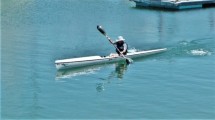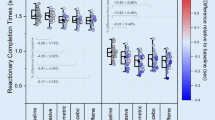Abstract
While self-controlled practice has been shown to enhance motor learning with various populations and novel tasks, it remains unclear if such effects would be found with athletes completing familiar tasks. Study 1 used a single case-study design with a world-champion kickboxer. We investigated whether giving the athlete a choice over the order of punches would affect punching velocity and impact force. Separated by 1 min of rest, the athlete completed 2 rounds of 12 single, maximal effort punches (lead straight, rear straight, lead hook and rear hook) delivered to a punching integrator in a counterbalanced order over six testing days. In one round the punches were delivered in a predetermined order while in the second round the order was self-selected by the athlete. In the choice condition, the world champion punched with greater velocities (6–11 %) and impact forces (5–10 %). In Study 2, the same testing procedures were repeated with 13 amateur male kickboxers over 2 testing days. Similar to Study 1, the athletes punched with significantly greater velocities (6 %, p < 0.05) and normalised impact forces (2 %, p < 0.05) in the choice condition. These findings complement research on autonomy support in motor learning by demonstrating immediate advantages in force production and velocity with experienced athletes.



Similar content being viewed by others
References
Aarts, H., Bijleveld, E., Custers, R., Dogge, M., Deelder, M., Schutter, D., & Haren, N. E. (2012). Positive priming and intentional binding: eye-blink rate predicts reward information effects on the sense of agency. Social Neuroscience, 7, 105–112.
Aiken, C. A., Fairbrother, J. T., & Post, P. G. (2012). The effects of self-controlled video feedback on the learning of the basketball set shot. Frontiers in Psychology, 3, 1–8.
Ali, A., Fawver, B., Kim, J., Fairbrother, J., & Janelle, C. M. (2012). Too much of a good thing: random practice scheduling and self-control of feedback lead to unique but not additive learning benefits. Frontiers in Psychology, 3, 1–9.
Catania, A. C. (1975). Freedom and knowledge: an experiental analysis of performance in pigeons. Journal of the Experimental Analysis of Behavior, 24, 89–106.
Chaabène, H., Tabben, M., Mkaouer, B., Franchini, E., Negra, Y., Hammami, M., & Hachana, Y. (2014). Amateur boxing: physical and physiological attributes. Sports Medicine, 45, 337–352.
Chiviacowsky, S., Wulf, G., de Medeiros, F. L., Kaefer, A., & Tani, G. (2008). Learning benefits of self-controlled knowledge of results in 10-year-old children. Research Quarterly for Exercise and Sport, 79, 405–410.
Chiviacowsky, S., Wulf, G., Lewthwaite, R., & Campos, T. (2012). Motor learning benefits of self-controlled practice in persons with Parkinson’s disease. Gait & Posture, 35, 601–605.
Cohen, J. (1992). A power primer. Psychological Bulletin, 112, 155–159.
Davis, P., Benson, P. R., Pitty, J. D., Connorton, A. J., & Waldock, R. (2015). The activity profile of elite male amateur boxing. International Journal of Sports Physiology and Performance, 10, 53–57.
Deci, E. L., & Ryan, R. M. (2000). The” what” and” why” of goal pursuits: human needs and the self-determination of behavior. Psychological Inquiry, 11, 227–268.
Deci, E. L., & Ryan, R. M. (2002). Overview of self-determination theory: an organismic dialectical perspective. Handbook of Self-Determination Research (pp. 3–33). New York: University Rochester Press.
Foreman, K. B., Singer, M. L., Addison, O., Marcus, R. L., LaStayo, P. C., & Dibble, L. E. (2014). Effects of dopamine replacement therapy on lower extremity kinetics and kinematics during a rapid force production task in persons with Parkinson disease. Gait & Posture, 39, 638–640.
Halperin, I., Chapman, D. T., & Martin, D. T., Abbiss, C. (2016a). The effects of attentional feedback instructions on punching velocity and impact forces among trained combat athletes. Journal of Sports Sciences, 18, 1–8.
Halperin, I., Hughes, S., & Chapman, D. T. (2016b). Physiological profile of a professional boxer preparing for Title Bout: a case study. Journal of Sports Sciences, 16, 1–8.
Halperin, I., Pyne, D. B., & Martin, D. T. (2015). Threats to internal validity in exercise science: a review of overlooked confounding variables. International Journal of Sports Physiology and Performance, 10, 823–829.
Hartman, J. M. (2007). Self-controlled use of percived physical assistance device during a balancing task. Perceptual and Motor Skills, 104, 1005–1016.
Hopkins, W. G. (2004). How to interpret changes in an athletic performance test. Sportscience, 8, 1–7.
Janelle, C. M., Barba, D. A., Frehlich, S. G., Tennant, L. K., & Cauraugh, J. H. (1997). Maximizing performance feedback effectiveness through videotape replay and a self-controlled learning environment. Research Quarterly for Exercise and Sport, 68, 269–279.
Janelle, C. M., Kim, J., & Singer, R. N. (1995). Subject-controlled performance feedback and learning of a closed motor skill. Perceptual and Motor Skills, 81, 627–634.
Kinugasa, T. (2013). The application of single-case research designs to study elite athletes’ conditioning: an update. Journal of Applied Sport Psychology, 25, 157–166.
Lee, W., & Reeve, J. (2013). Self-determined, but not non-self-determined, motivation predicts activations in the anterior insular cortex: an fMRI study of personal agency. Social Cognitive Affective Neuroscience, 8, 538–545.
Leotti, L. A., & Delgado, M. R. (2011). The inherent reward of choice. Psychological Science, 22, 1310–1318.
Leotti, L. A., Iyengar, S. S., & Ochsner, K. N. (2010). Born to choose: the origins and value of the need for control. Trends in Cognitive Sciences, 14, 457–463.
Lessa, H. T., & Chiviacowsky, S. (2015). Self-controlled practice benefits motor learning in older adults. Human Movement Science, 40, 372–380.
Lewthwaite, R., Chiviacowsky, S., Drews, R., & Wulf, G. (2015). Choose to move: the motivational impact of autonomy support on motor learning. Psychonomic Bulletin & Review, 22, 1383–1388.
Lim, S., Ali, A., Kim, W., Kim, J., Choi, S., & Radlo, S. J. (2015). Influence of self-controlled feedback on learning a serial motor skill. Perceptual and Motor Skills, 120, 462–474.
Pierce, J. D., Reinbold, K. A., Lyngard, B. C., Goldman, R. J., & Pastore, C. M. (2006). Direct measurement of punch force during six professional boxing matches. Journal of Quantitative Analysis in Sports, 2, 1–17.
Post, P. G., Fairbrother, J. T., & Barros, J. A. (2011). Self-controlled amount of practice benefits learning of a motor skill. Research Quarterly for Exercise and Sport, 82, 474–481.
Rodin, J., & Langer, E. J. (1977). Long-term effects of a control-relevant intervention with the institutionalized aged. Journal of Personality and Social Psychology, 35, 897–902.
Sanli, E., Patterson, J., & Bray, S. (2013). Understanding self-controlled motor learning protocols through the self-determination theory. Frontiers in Movement Science and Sport Psychology, 3, 1–17.
Schmidt, R. A., & Lee, T. D. (2011). Motor control and learning (5th ed.). Champaign: Human Kinetics.
Smith, M., Dyson, R., Hale, T., & Janaway, L. (2000). Development of a boxing dynamometer and its punch force discrimination efficacy. Journal of Sports Sciences, 18, 445–450.
Tafarodi, R. W., Milne, A. B., & Smith, A. J. (1999). The confidence of choice: evidence for an augmentation effect on self-perceived performance. Personality and Social Psychology Bulletin, 25, 1405–1416.
Teixeira, P. J., Carraça, E. V., Markland, D., Silva, M. N., & Ryan, R. M. (2012). Exercise, physical activity, and self-determination theory: a systematic review. International Journal of Behavioral Nutrition and Physical Activity, 9, 1–30.
Tiger, J. H., Hanley, G. P., & Hernandez, E. (2006). An evaluation of the value of choice with preschool children. Journal of Applied Behavior Analysis, 39, 158–164.
Turner, A., Baker, E., & Miller, S. (2011). Increasing the impact force of the rear hand punch. Strength & Conditioning Journal, 33, 2–9.
Voss, S. C., & Homzie, M. (1970). Choice as a value. Psychological Reports, 26, 912–914.
White, R. W. (1959). Motivation reconsidered: the concept of competence. Psychological Review, 66, 297–333.
Wulf, G. (2007). Self-controlled practice enhances motor learning: implications for physiotherapy. Physiotherapy, 93, 96–101.
Wulf, G. (2013). Attentional focus and motor learning: a review of 15 years. International Review of Sport and Exercise Psychology, 6, 77–104.
Wulf, G., & Adams, N. (2014). Small choices can enhance balance learning. Human Movement Science, 38, 235–240.
Wulf, G., & Lewthwaite, R. (2016). Optimizing performance through intrinsic motivation and attention for learning: the OPTIMAL theory of motor learning. Psychonomic Bulletin & Review,. doi:10.3758/s13423-015-0999-9.
Wulf, G., & Toole, T. (1999). Physical assistance devices in complex motor skill learning: benefits of a self-controlled practice schedule. Research Quarterly for Exercise and Sport, 70, 265–272.
Wulf, G., Raupach, M., & Pfeiffer, F. (2005). Self-controlled observational practice enhances learning. Research Quarterly for Exercise and Sport, 76, 107–111.
Wulf, G., Freitas, H. E., & Tandy, R. D. (2014). Choosing to exercise more: small choices increase exercise engagement. Psychology of Sport and Exercise, 15, 268–271.
Author information
Authors and Affiliations
Corresponding author
Ethics declarations
Funding
No funding was required for this study.
Conflict of interest
Israel Halperin declares that he has no conflict of interest. Dale Chapman declares that he has no conflict of interest. David Martin declares that he has no conflict of interest. Rebecca Lewthwaite declares that she has no conflict of interest. Gabriele Wulf declares that she has no conflict of interest.
Ethical approval
All procedures performed in studies involving human participants were in accordance with the ethical standards of the institutional and/or national research committee and with the 1964 Helsinki declaration and its later amendments or comparable ethical standards. This article does not contain any studies with animals performed by any of the authors.
Informed consent
Informed consent was obtained from all individual participants included in the study.
Rights and permissions
About this article
Cite this article
Halperin, I., Chapman, D.W., Martin, D.T. et al. Choices enhance punching performance of competitive kickboxers. Psychological Research 81, 1051–1058 (2017). https://doi.org/10.1007/s00426-016-0790-1
Received:
Accepted:
Published:
Issue Date:
DOI: https://doi.org/10.1007/s00426-016-0790-1




